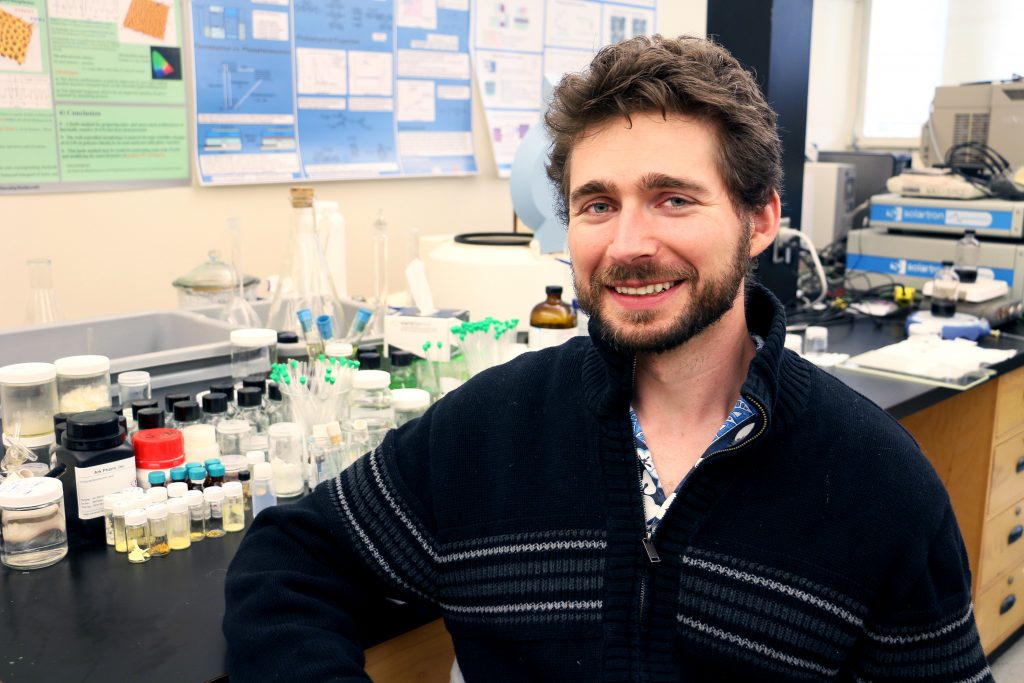The Province: B.C. universities grease the skids for marketable innovation
Oct 03, 2016
Ben Britton is a member of of the first cohort of students in the new Graduate Certificate in Science and Technology Commercialization program at the Beedie School of Business.
The following is an extract from an article published by The Province on September 30.
By Randy Shore.
Scientists like Ben Britton know what they know. They know science.
“What I didn’t know was how to start a business,” said Britton, who is among the first graduates of Simon Fraser University’s Graduate Certificate in Science and Technology Commercialization. “I was a typical scientist, I thought, ‘How hard can it be?’”
The math, it turns out, was easy.
“The rest of the business part was not easy at all, talking to people about the science and speaking to the things that investors actually care about was much harder,” said Britton. “It was about talking like a human, we were all clueless.”
He took those lessons to heart, though, and in June snagged a $50,000 prize for his product pitch at the Hong Kong-Canada National Investment Pitch Competition. The company also received $450,000 from the Thiel Foundation’s Breakout Labs for radical innovation and expects to acquire about $3 million in seed financing from other investors in December.
Britton and his colleagues at what is now Ionomr created the first alkaline-stable polymer membrane in 2010, apparently solving one of the most troubling and expensive problems associated with advanced batteries and fuel cells. The technology is also a durable alternative to existing water purification membranes.
It took the better part of five years before Steve Holdcroft, vice-president of research, was able to up scale the technology.
“At that point we showed that we were the best in the world at making anion-exchange membranes and since then we’ve improved the alkaline stability of the membrane about 10,000 times,” he said. Even so, it may be years before the material debuts in a commercial device.
“It’s a long pipeline,” said Britton. “So you need investors with a long view.”
Ionomr’s next step is to upscale the manufacturing process from membrane sheets less than a foot square to 100,000 square metres per year.
“There really is no in between,” Britton said.
SFU’s Beedie School of Business created the certificate program to help their students and faculty bring their work to a waiting world.
“We punch above our weight on invention in Canada, we are very good at it,” said Elicia Maine, program director. “But we are not as good at getting innovations into patents and then into products and services.”
The program aims to give scientists and engineers new tool sets — market assessment, financial literacy and business planning — and connect them with industries that are increasingly looking to universities rather than in-house R&D for innovation.
“We had been researching the best ways to create science-based business and one of the things we found was that there are real barriers to the translation of science from the university to the private sector,” Maine said.
In the course of their studies certificate students pitch to companies and venture capitalists eager to place bets on radical innovation.
In June, SFU received a $10-million donation from alumnus Charles Chang, founder of Vega plant-based foods, to establish a new entrepreneurship institute on campus. The Charles Chang Innovation Centre will be home to RADIUS (RADical Ideas, Useful to Society), a social innovation lab and business incubator.
In fact, all of B.C.’s top research universities are redoubling efforts to convert the intellectual property produced by their students and faculty into dollars, through patents, royalties and viable commercial enterprises.
Read the full article on The Province website.
About Ross MacDonald-Allan
Twitter •